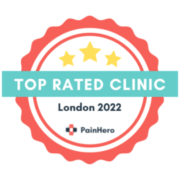Did you know that sports-related concussion are the most common cause of head injury in adolescents and young adults?
Traditional treatment for concussion includes physical and cognitive rest. Unfortunately, individuals prescribed with rest can demonstrate withdrawal from life activities, deconditioning, and mental health issues. Research is emerging that shows the benefit of exercise and early physical activity after a concussion. Specifically, early physical activity is advantageous and lower rates of post-concussive symptoms are associated with higher levels of physical activity and this research states that patients suffering from concussion should be encouraged to exercise as tolerated 1-2 days after concussion and initial rest. Individuals with a concussion present with varying symptoms and presentations requiring patient-specific intervention strategies. According to a clinical practice guideline, recommended frequency, intensity, timing, and type(s) of intervention is dependent on the severity of a patient’s concussion, their level of irritability, and how they respond to treatment. Patients should also be educated on symptom reporting so that interventions can be adjusted resulting in earlier return to sport.
If you or anyone you know is suffering from concussion, why not consider physiotherapy to help with headaches, neck pain, muscle tension and balance issues?
Reach out to BacknMotion and book an assessment today!

